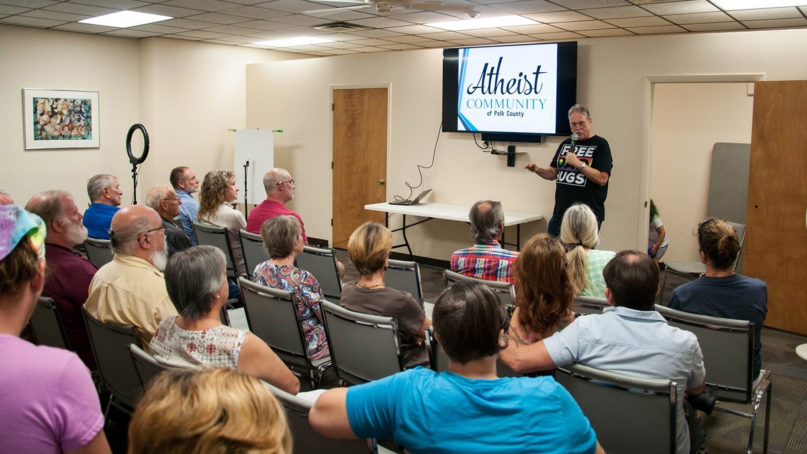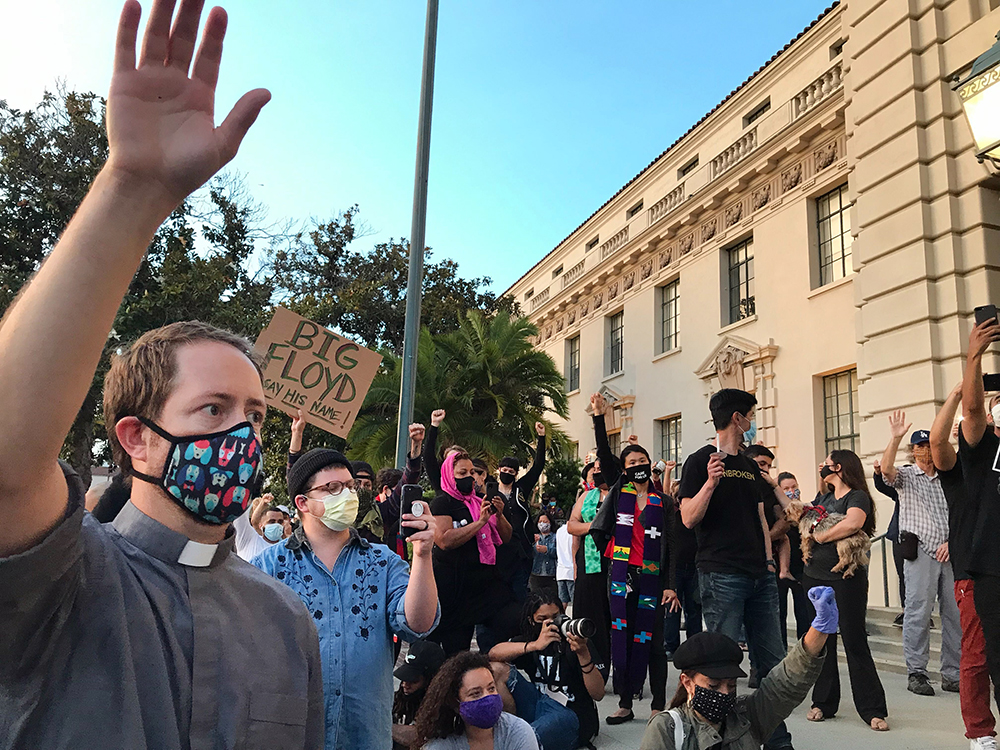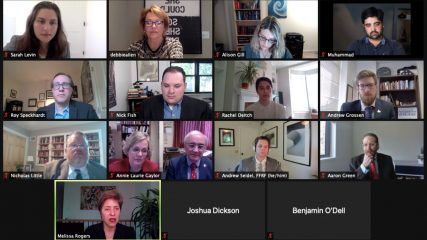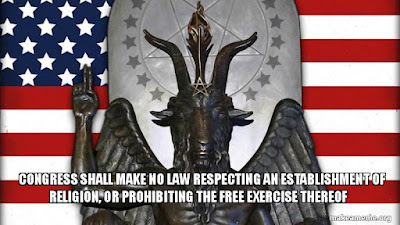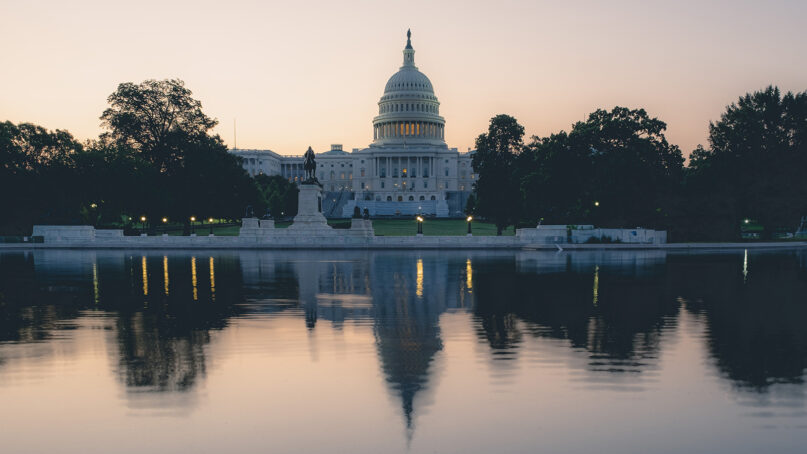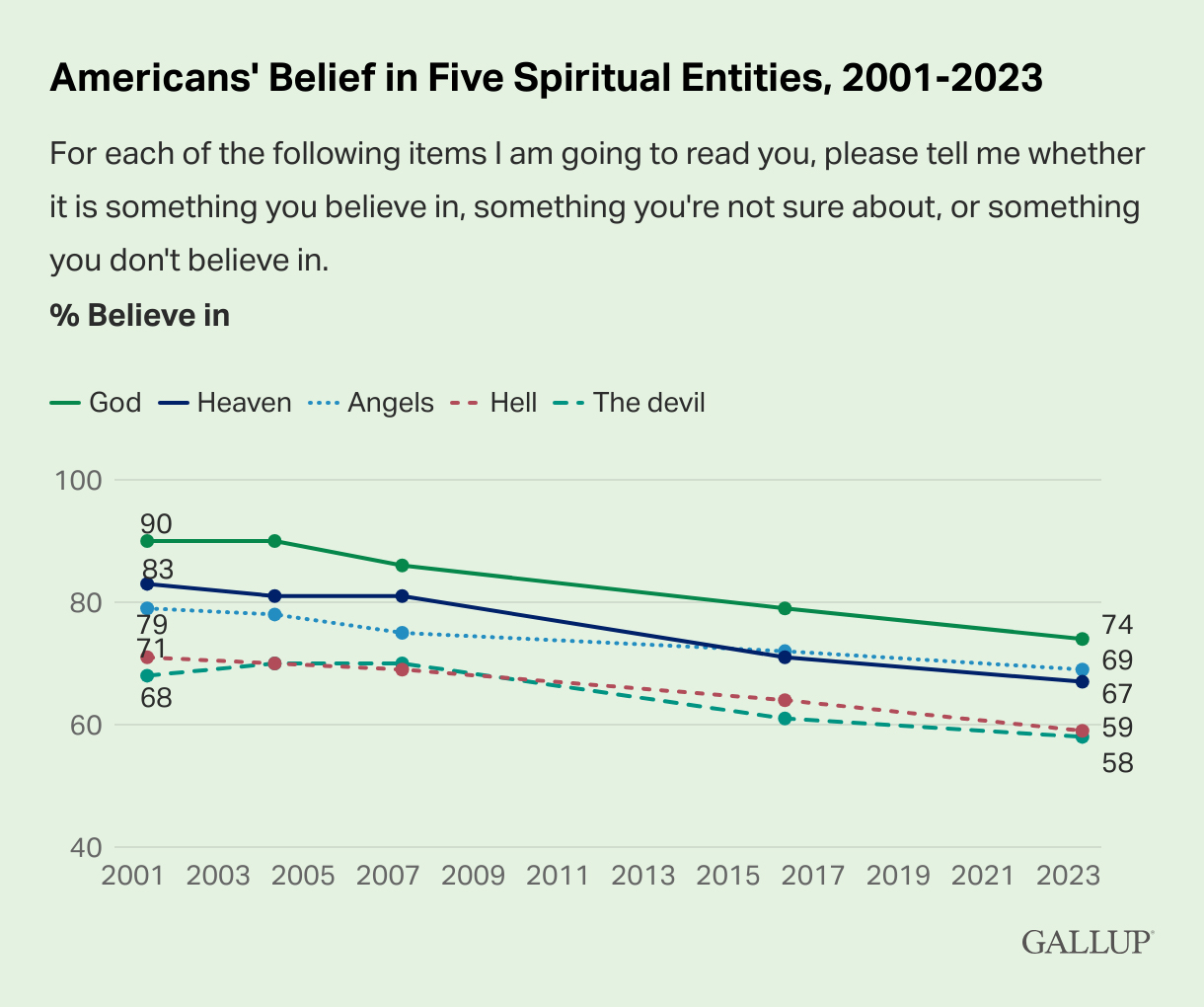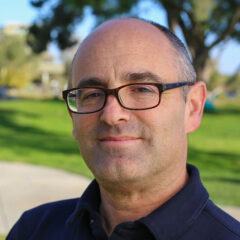BERKELEY (RNS) — For participants worldwide, the holiday offers a meaningful, musical opportunity to stare down the dark. At this year’s Bay Area Secular Solstice, that looked like grappling with the possibility of superintelligent AI wiping out humanity.
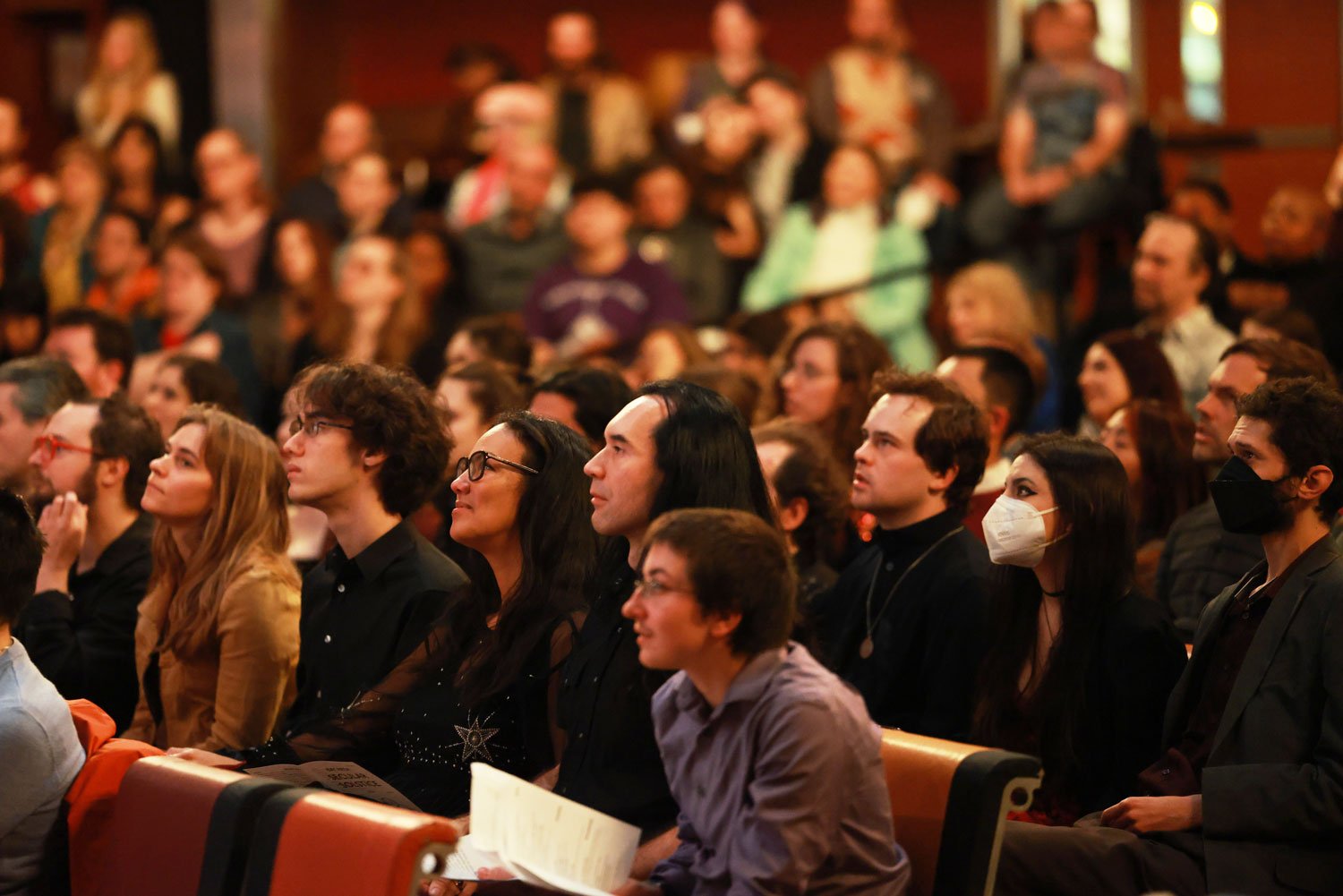
The audience at the 2024 Bay Secular Solstice at The Freight in Berkeley, CA. Photo courtesy Raymond Arnold
Hayden Royster
December 19, 2025
RNS
BERKELEY (RNS) — Raymond Arnold sat in the dark on the edge of a Berkeley stage in early December, his voice breaking as he addressed the nearly 500 people gathered for Secular Solstice. “Guys…” he whispered into the microphone. “I don’t think we’re gonna make it.”
Arnold, a web developer and founder of the now 15-year-old Rationalist holiday, admitted he thought this could, potentially, be “the last Solstice.”
Winter solstice traditions around the world and across religions mark the shortest day of the year and offer observers a meaningful way to stare down the dark or, as Arnold puts it, “challenge the Abyss to a staring contest and win.” At this year’s Bay Area Secular Solstice, that meant grappling with the possibility of superintelligent AI wiping out humanity — a future some Rationalists, including Arnold, believe may be near.
Secular Solstice began one December evening in 2011, when Arnold and 19 friends crammed into a New York City apartment, illuminated by plasma balls, oil lamps and lightsabers, to beta-test a new holiday. Arnold, a Catholic-turned-humanist, was looking to create a tradition that reflected his new worldview. He’d recently discovered Rationalism, an internet-born movement focused on sharpening reasoning skills to better society. The community — which took seriously futuristic notions like interstellar colonization and artificial intelligence — “radically expanded my sense of how much sacredness I could feel,” Arnold said. For him, creating Secular Solstice was an experiment in Rationalist ritual.

Raymond Arnold, who hosted and oversaw this year’s Bay Area Secular Solstice, created the holiday in 2011. Photo courtesy Raymond Arnold
Fifteen years on, Arnold’s homegrown holiday has expanded dramatically, with people gathering for solstices and “smolstices” in New York, Maryland, Kansas, Texas, Washington, Illinois, Canada, the United Kingdom, New Zealand and Russia. At this year’s Bay Area Secular Solstice on Dec. 6, attendees filled the 490-seat theatre at The Freight, a music venue not far from UC Berkeley’s campus, settling in for a multi-hour production with a live band and a 28-person choir. A few wore Santa hats; more wore lightweight puffer jackets. Before the show, Solstice organizers scurried about the lobby, hastily dispensing battery-powered fairy light strands to the crowd.
Anna Tchetchetkine, who works in policy at Google, appreciates the event’s frank appraisal of death, as well as “the Solstice arc” — a journey from light to dark to light again, engaging with humanity’s past, present and future.
“It can be very, very emotionally poignant and heavy and cathartic and joyful,” said Tchetchetkine, who attended her first Solstice in 2015 and has been involved in its production ever since. “It definitely feels like something sacred to me, in a way.”
Tchetchetkine was the creative lead of the Bay Area Secular Solstice in 2023 and is a director of the event’s choral group, the Bayesian Choir, named for the 18th-century mathematician Thomas Bayes. Tchetchetkine likens Solstice to “a pilgrimage season,” noting friends who were journeying from Paris and Berlin to take part. “It’s the community’s biggest event,” she said.
While Arnold had once envisioned Secular Solstice as a mainstream holiday for atheists and skeptics, he acknowledged it has largely become a Rationalist tradition.
The Rationalist community first arose in the mid-2000s, coalescing around the work of AI researcher Eliezer Yudkowsky. His writings — particularly “Sequences” and the fan-fiction novel “Harry Potter and the Methods of Rationality” — became seminal texts for the burgeoning movement, and his then-blog “LessWrong” grew into a virtual town square.
Over the years, the community has evolved — though defining its borders is tricky, even for those within them. What is evident, though, is its profound impact on Silicon Valley, particularly in AI safety. According to a Bay Area Secular Solstice guest list, numerous AI researchers from companies like Google DeepMind and Anthropic, and nonprofits like Machine Intelligence Research Institute and Redwood Research, were in attendance. This year, Solstice-goers from afar were invited to stay at Lighthaven — the Berkeley hotel turned conference and research center with a mission of “ensuring that humanity survives this century,” according to its parent company, Lightcone Infrastructure. Alongside Lighthaven, Lightcone now oversees “LessWrong.”
Religious language is often used to characterize Rationalism, to some people’s chagrin. Others embrace it; Arnold, who now helps run “LessWrong” and Lighthaven, has earnestly described his role as a “village priest.” Secular Solstice, especially, is spoken of in spiritual terms. One “LessWrong” user called it “the most Church Service shaped thing I have ever seen which wasn’t a church service.”
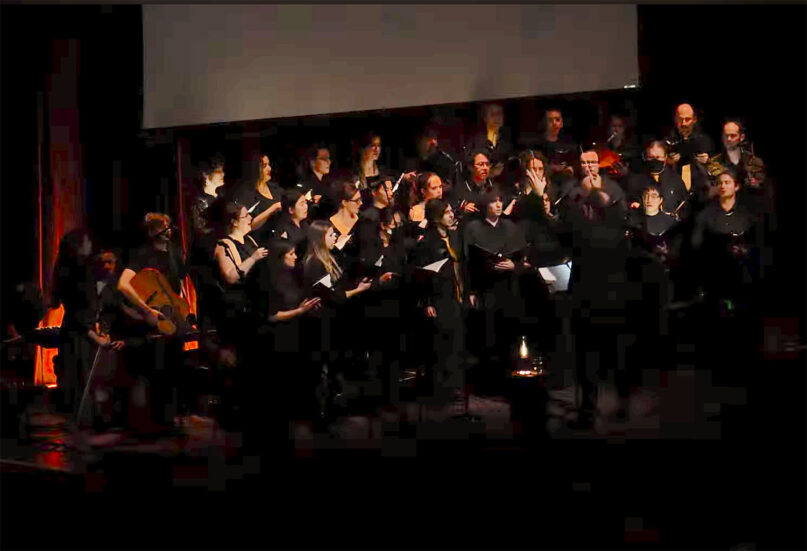
The Bayesian Choir, a choral group that performs annually at the Bay Area Secular Solstice. Video screen grab from Bay Area Secular Solstice livestream
To kick off the 2025 Bay Area Secular Solstice, Arnold and the band led the audience in singing the Monty Python classic, “Always Look on the Bright Side of Life,” followed by “Bring the Light”: one of numerous songs written by Arnold and others to be sung at Secular Solstices worldwide.
Between songs, community members gave speeches that ranged from historical to deeply personal. At one point, Arnold shared the Cold War origins of the carol “Do You Hear What I Hear?” Later, another speaker shared a story of cryogenically preserving a deceased friend.
With each progressively somber element, the Freight’s chandeliers dimmed a notch. In a “LessWrong” post days earlier, Arnold had warned that this year would focus on “actually looking at human extinction in nearmode.” Arnold has not been heavily involved in planning Solstice for years, letting others take the lead. But he felt a sense of urgency to host this year, given AI’s breakneck development.
Arnold’s “Last Solstice” speech and ensuing song, “The Last Lifeboat,” were a pivot point, and the songs and speeches to follow — with titles like “Not Resigned” and “Brighter than Today” — expressed increasing defiance, if not quite hope. The house lights gradually rose. Those with fairy lights draped across their shoulders flicked them back on again.
Arnold’s sentiments echoed those of Yudkowsky’s bestselling new book, “If Anyone Builds It, Everyone Dies.” Yudkowsky argues that by default, companies trying to create and align superintelligent AI will lose control. If they do, he believes, catastrophe is inevitable.

Anna Tchetchetkine, co-director of the Bayesian Choir. Photo courtesy Tchetchetkine
While some Rationalists are indeed afraid of this, others, including Tchetchetkine, are less certain. “I am not as doomy as Ray,” she acknowledged. “But I do find it plausible, which is scary.”
Around the two-hour mark, Robert Miles, an AI safety researcher and popular YouTuber, shared an adapted version of C.S. Lewis’ 1948 essay on looming nuclear war. “Let that AI, when it comes, find us working or teaching, singing, playing with children, calling our elected representative …” Miles said. “Let the AI find you doing well.”
Moments later, various community members offered perspectives on “Living in a Possibly Doomed World.” One was Yudkowsky, who rose from his seat and gave a typically wry, and rational, assessment: “Going insane because the world is ending is a skill issue.”
The evening culminated with “Five Thousand Years,” Arnold’s song that envisions a day when humans journey beyond Earth and perhaps outlive it. “We’ll take a moment, one by one/ Turn to face the dying sun/ Bittersweetly wave goodbye/ The journey’s only just begun,” hundreds of voices sang.
In an email afterward, Arnold emphasized that he doesn’t believe “AI pessimism” should be the thrust of Secular Solstice from now on. “While it was important to do once,” he wrote, “ I don’t think it’d actually be healthy.” Based on feedback data, Arnold said a small minority felt “alienated” or “annoyed” by this year’s event. But plenty of others found it moving, even “healing.”
One attendee, Amanda Luce, blogged about her experience. She initially had reservations about an AI-focused Solstice, worrying it would exclude newcomers or “normies.” But walking through the Berkeley streets afterward, en route to the afterparty at Lighthaven, Luce felt seen.
“That service was for us,” she wrote. “It was for the AI Doomers.” Sometimes, she reminded Rationalist readers, it’s important to “do the rituals that we need for ourselves.”
This article was produced as part of the RNS/Interfaith America Religion Journalism Fellowship.
